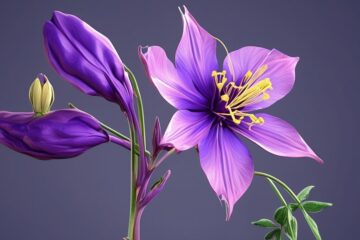Did you know that chamomile is one of the most widely consumed herbal teas in the world, with over one million cups being consumed every day? This humble flower, with its delicate white petals and calming aroma, has captured the attention of people seeking relaxation and healing for centuries.
But what exactly makes chamomile so special? How does it work its magic on our bodies and minds? In this discussion, we will explore the therapeutic properties of chamomile, its origins and cultural significance, the language of flowers, and even some brewing tips for the perfect cup of chamomile tea.
So sit back, sip your chamomile-infused beverage, and let us embark on a journey to discover the wonders of chamomile calm.
Chamomile's Therapeutic Properties
Chamomile's therapeutic properties are attributed to its bioactive constituents, such as terpenoids and flavonoids, which contribute to its healing effects. Drinking chamomile tea, a popular herbal tea made from the chamomile plant, has been commonly used for its potential health benefits.
Research suggests that chamomile tea can help improve sleep, reduce anxiety, and soothe the stomach. The mild sedative properties of chamomile tea may promote relaxation and aid in falling asleep. Additionally, chamomile tea is known for its ability to alleviate digestive issues and reduce inflammation.
The potential benefits of chamomile extend beyond sleep and digestion, with studies indicating anti-inflammatory and anticancer properties. With its wide range of health benefits, chamomile tea is often used as a natural remedy for various ailments.
Story and Origins
With its rich history and origins dating back centuries, the story of chamomile unfolds into a fascinating tale of herbal medicine and cultural traditions. Chamomile has been used for its therapeutic properties in various forms, including as a tea. People around the world drink chamomile tea to promote relaxation and alleviate symptoms of anxiety and insomnia.
The two most common varieties of chamomile are German Chamomile and Roman Chamomile. Both varieties have been extensively studied for their pharmacological activities and quality. Studies suggest that chamomile, when consumed in the form of tea or included in products containing chamomile, may reduce symptoms of generalized anxiety disorder. Moreover, chamomile has been shown to reduce inflammation and promote better sleep.
However, it's important to note that chamomile may have some side effects, such as allergic reactions in certain individuals.
Chamomile's Cultural Significance
Culturally cherished for centuries, chamomile holds significant value in various traditions for its numerous therapeutic benefits and versatile applications. Known as the 'flower of relaxation and healing,' chamomile has a long history of cultural significance.
One of the most popular ways chamomile is used is in the form of chamomile tea, which is known for its mild sedative properties and ability to improve sleep quality.
In traditional medicine, chamomile is highly regarded for its medicinal properties, including anti-inflammatory and antioxidant effects. It has been used in different cultures to treat various ailments, such as inflammation, skin irritations, digestive disorders, menstrual discomfort, and insomnia.
Chamomile's cultural significance extends beyond medicine, as it's also used in cosmetics, aromatherapy, and as a flavoring agent in food and beverages.
With its deep cultural roots and versatile applications, chamomile continues to be treasured and celebrated around the world.
Flower Language and Meanings
As we explore the realm of flower language and meanings, we uncover a fascinating tradition that has been cherished for centuries.
Flower language, also known as floriography, allows us to express emotions and convey messages through the choice of flowers. Each flower has its own specific meaning, and understanding these meanings adds depth and sentiment to gift-giving.
In the case of chamomile, the flower of relaxation and healing, it traditionally symbolizes patience, peace, and calmness. Chamomile tea, derived from the chamomile flower, has long been used in herbal medicine for its sedative effect, helping to alleviate anxiety and promote relaxation.
Chamomile Tea Brewing Tips
Brew a perfect cup of chamomile tea by following these simple tips.
To start, use 1-2 teaspoons of dried chamomile flowers per cup of hot water. Steep the chamomile flowers in hot water for 5-10 minutes to extract the medicinal properties effectively.
Remember to cover the chamomile tea while steeping to retain the essential oils and prevent the escape of volatile compounds.
After steeping, strain the chamomile tea to remove the flowers and avoid a bitter taste from over-steeping. If desired, you can add honey or lemon for flavor after brewing to enhance the taste and enjoy additional health benefits.
Keep in mind that drinking chamomile tea is generally safe, but research indicates that consuming chamomile may reduce the risk of coronary heart disease and boost the immune system. However, it's important to note that chamomile tea shouldn't be given to infants and young children as it may increase the risk of allergic reactions.
Chamomile Tea Gift Ideas
If you're looking for a thoughtful gift that promotes relaxation and wellness, consider gifting a high-quality chamomile tea blend. Chamomile has been used for centuries as an ingredient in herbal remedies and is well-known for its calming properties. Many people drink chamomile tea every day to unwind and de-stress.
This herbal tea contains chamomile, an herb that belongs to the daisy family. Chamomile tea has been used for centuries as a traditional remedy for various ailments, including insomnia, anxiety, and digestive issues. Its soothing effects can help calm the mind and promote a sense of relaxation.
When choosing a chamomile tea gift, explore options like Egyptian Chamomile Herbal Tea and Lavender Lullaby Herbal Tea for unique flavors and added benefits. You can also consider subscription options to gift a consistent supply of chamomile tea to your loved ones. Big Sky Breeze and Chamomile Calm are great choices for tea enthusiasts, and top-rated options like GinCream Rooibos are sure to be well-received.
Concluding Thought
To wrap up our discussion, let's reflect on the versatility and numerous health benefits of chamomile, making it a valuable herb for relaxation and healing.
Chamomile has been used for centuries in herbal medicine for its soothing properties and therapeutic effects. Scientific research has provided evidence of its efficacy in treating various health problems, including anxiety and digestive issues.
Chamomile's traditional uses extend beyond its anti-anxiety properties, as it has also been found to reduce inflammation, support immune system function, and promote general well-being.
While chamomile is generally safe for most individuals, those with allergies or certain medical conditions should exercise caution.
Frequently Asked Questions
Does Chamomile Have a Calming Effect?
Chamomile does have a calming effect. It can help alleviate stress, promote relaxation, and improve sleep quality. Regular consumption of chamomile tea may have a stress-relieving effect, making it beneficial for anxiety and insomnia.
Who Should Not Drink Chamomile Tea?
If you have a known allergy to related plants or have had a reaction to chamomile products before, you shouldn't drink chamomile tea. Also, if you're on blood-thinning medication, pregnant, or have young children, it's best to avoid it.
How Long Does Chamomile Take to Calm You Down?
Chamomile tea takes about 30-45 minutes to calm you down. Its calming effects can last for 1-2 hours, reducing anxiety and promoting relaxation. Remember, results may vary, so consult a healthcare professional for personalized guidance.
Is It OK to Drink Chamomile Tea Everyday?
Yes, it's okay to drink chamomile tea everyday. It can provide potential health benefits, reduce inflammation, promote better sleep, and offer antioxidants. But consult a healthcare professional if you have existing health conditions or are pregnant.





